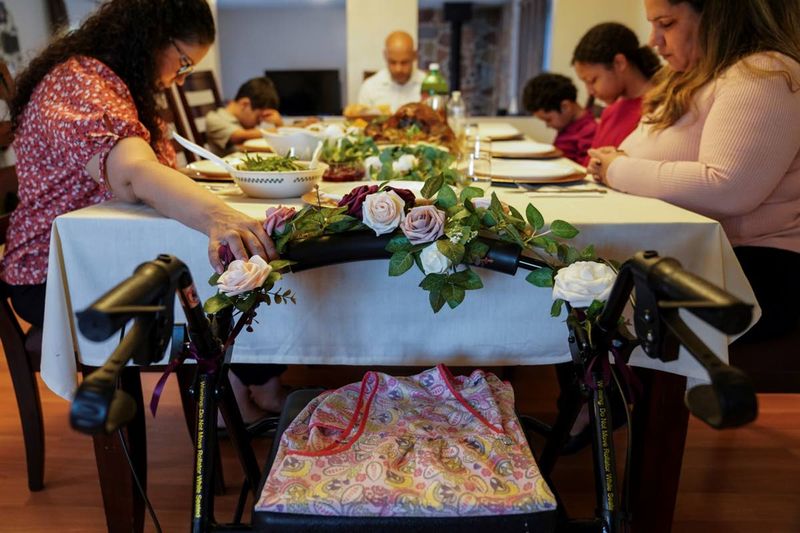Have you sat at the dinner table, smiling politely, passing potatoes while screaming on the inside: How the heck did we end up talking about cloud cover instead of the stuff that actually matters? You start to feel like a ghost in your own family—present, but not seen.
You second-guess everything: Was I too much? Not enough? Did I mess this up, or are they just… different now? And while everyone on the outside thinks you’re doing fine, on the inside, you’re doing Olympic-level emotional gymnastics just to keep things from falling apart.
It’s exhausting. It’s lonely. And if you’re quietly hurting, wondering when your kid stopped caring, or if they ever really saw you in the first place—you’re not crazy, and you’re definitely not alone.
So let’s rip the bandage off and talk about it. Let’s dig into the raw, messy, uncomfortable truth—the signs your grown kids just don’t appreciate you anymore. No sugarcoating, no fake family-holiday smiles. Just the red flags you’ve been trying to ignore, and what it really feels like when love starts to feel one-sided.
1. They Dodge Every Real Conversation
Ever try to ask your adult kid about their life and get little more than half-shrugs and changing the subject? It’s like every attempt at a real conversation hits a brick wall. The air goes cold, and suddenly, you’re rerouted to safe, shallow topics—how’s work, how’s traffic, anything but how they actually feel.
Sometimes, all you want is to know what’s going on with them, but you end up feeling like an outsider. You remember when they’d spill their heart out on the couch, and now you can’t even get past the weather. That distance you feel? It’s real, and it’s exhausting trying to close the gap alone.
If your kid can’t be bothered to let you in on the deeper stuff, ask yourself: what changed? Emotional avoidance doesn’t always mean anger; sometimes it’s about fear or resentment. But being shut out stings, especially when you know what real closeness used to feel like.
2. Gratitude Is a Foreign Language
Remember when a simple “thanks, Mom” or a hug would light up your whole day? Now it’s radio silence—even on your birthday. You cook, you call, you show up, and it barely registers.
It’s a kind of emotional drought you can’t just water with more effort. You find yourself scanning every text or email for a scrap of warmth, but gratitude is like a language they forgot to learn. The smallest acknowledgment would change everything, but you get nothing but silence.
It hurts, especially when you know how hard you’ve tried. You start to question if you did too much, or maybe too little. But deep down, you know this absence says more about where they are than what you did.
3. Boundaries Become Barricades
Boundaries are healthy, sure. But there’s a difference between drawing a line and building a fortress. Suddenly, you’re on the outside of everything—family events, big news, even little updates.
You get the sense that every interaction is scheduled, scripted, and only by their terms. Invitations get lost. Your calls are screened. It’s not just privacy—it’s exclusion. The message is clear: you’re not welcome past this point.
The sting comes from knowing you once were the safe place. Now, you hover near their life, waiting for a crack in the wall. When boundaries stop feeling respectful and start feeling like rejection, it’s time to ask: what are they really protecting themselves from?
4. You Only Hear from Them When They Need Something
There’s no mistaking the pattern: phone rings only when a favor’s needed. Car trouble, money shortfalls, last-minute babysitting. The emergencies are always yours to solve.
When’s the last time you got a call just to share good news? Or to check in on you? There’s a difference between leaning on family and treating someone like a vending machine.
You start to resent every ring, expecting the ask before you even say hello. Real relationships don’t feel this transactional. Being useful is not the same as being loved.
5. Old Grudges Never End
You can practically recite the list of every mistake you ever made as a parent—because they won’t let you forget. Every argument circles back to something you did years ago. It’s like living in a courtroom where you’re always on trial.
Forgiveness feels impossible, and discussions never move forward. You try to apologize, but it’s never enough. It’s as if your whole relationship is built on old wounds.
Holding onto resentment isn’t just exhausting for you—it eats away at whatever chance you had for real connection. The past becomes a wall, not a bridge. You wonder if they even see the person you are now.
6. Respect Is Out the Window
Ever feel like you’re stuck in a sitcom where every word you say is met with sarcasm or an eye roll? Respect isn’t just about big moments—it’s in the way you’re spoken to every single day.
Maybe they openly criticize your choices or dismiss your advice like you’re clueless. It’s not playful teasing. It cuts deeper, especially when it’s in front of others.
There’s a point where you stop trying to explain yourself. The hardest part isn’t the disrespect—it’s realizing you’re not seen as a person worth listening to anymore.
7. They’re Unmoved by Your Struggles
Remember the days when even a scraped knee would bring them running for comfort? Now, your pain is barely a blip on their radar. You could be in tears, but their empathy is switched off.
You share a tough day or a health scare, and the response is clipped or distracted. Sometimes, it feels like you’re talking to a wall. The absence of concern makes you feel not just alone, but invisible.
You crave a moment of genuine care, but receive indifference. That coldness is a sign something’s been lost—not just love, but basic human connection.
8. Family Gatherings? Suddenly Optional
Holidays used to mean chaos and laughter. Now, it’s a guessing game: will they show up, or will your table have empty seats again? Every excuse—busy schedules, other plans—lands like another rejection.
You keep traditions alive, hoping for a spark of togetherness. But the absence is deafening. Family photos grow outdated because no one’s there to make new memories.
When showing up becomes an option instead of a given, it sends a message. You’re no longer the gravitational center of the family—and it aches more than you expected.
9. You Hear About Yourself Secondhand
It stings to hear from neighbors or friends what your kid supposedly thinks of you. Maybe there’s gossip, complaints, or outright blame floating around—everywhere but to your face.
You ask yourself if you’re really that hard to talk to. It’s easier to complain to others than work things out directly, but the pain is sharper when you hear it secondhand. Your reputation becomes something you can’t control.
This isn’t just miscommunication—it’s a breakdown in trust. When your child chooses to vent to others rather than speak to you, it’s a signal the relationship needs mending.
10. Attempts at Reconciliation Go Nowhere
You reach out—apologies, letters, invitations to talk. But every effort is met with avoidance, deflection, or a flat-out no. The harder you try, the further away they move.
It feels like chasing a shadow, hoping for closure that never comes. You’re left wondering what else you could possibly do.
Sometimes, it’s not about finding the right words. It’s about whether they want to hear them. The pain of rejection runs deep, especially when all you want is a second chance.
11. Your Accomplishments Are Ignored or Mocked
Ever shared good news, only to have it brushed off—or worse, turned into a joke? You want to celebrate a win, but instead get a sarcastic comment or a bored look.
Once upon a time, you were their hero. Now, your achievements barely register or become the punchline at family dinners. It feels like nothing you do matters anymore.
This isn’t about ego—it’s about wanting to be seen, not just as a parent, but as a person. Dismissing your successes is a subtle way of saying you don’t count—and that cuts deeper than any argument.
12. You Walk on Eggshells
Every conversation feels like a minefield. You measure every word, afraid one wrong step will set off another explosion or cold shoulder.
Remember when home meant comfort? Now it feels like you’re working extra shifts as a peacekeeper, trying not to upset the fragile balance.
When you’re constantly policing yourself, you lose the simple joy of being yourself. That’s a warning sign: relationships aren’t supposed to be emotional obstacle courses.
13. Gifts and Gestures Are Overlooked
You put thought into gifts, notes, or even a simple act of kindness—and it’s all met with indifference. No thank you, barely a smile, and sometimes the gesture isn’t acknowledged at all.
You remember when the smallest surprise brought joy, but now it feels pointless. The lack of reaction stings, not because you want praise, but because it’s a measure of connection.
Little gestures are how we say we care. When those moments go unnoticed, it’s a sign the emotional current between you has dried up.
14. They Rewrite Family History
Somehow, the stories you remember are never quite the same as the ones your kid tells. Suddenly, the happy memories become twisted, or your good intentions are recast as failures.
You hear about moments that never happened, or see your own actions painted in the worst possible light. It feels like your whole history together is up for debate.
When your child can’t grant you the dignity of your own story, it’s not just frustrating—it’s lonely. Truth becomes slippery, and you feel erased from your own past.
15. You’re Treated Like a Burden
Ever walk into a room and feel like you’re in the way? Your presence is met with sighs, eye rolls, or that subtle shift in energy that says “here we go again.”
You start to avoid reaching out, not wanting to inconvenience anyone. But the loneliness grows heavier each time you’re pushed aside.
Being made to feel like a burden—rather than someone to love—chips away at your confidence. You want to belong, not beg for attention.
16. They Have Zero Curiosity About Your Life
You ask about their job, their friends, their health. Yet when was the last time they asked you… anything? The silence isn’t just neglectful—it’s a form of disregard.
You long to share your day, your dreams, or even your worries. But they never ask, never dig deeper, never remember the details.
It’s more than being forgotten. It’s being overlooked as a person—someone with thoughts, feelings, and a story worth hearing.
17. Your Efforts to Connect Feel One-Sided
You plan calls, send reminders, and make all the effort to keep the relationship going. But what comes back? Mostly ghosting, short replies, or last-minute cancellations.
It’s exhausting being the only one rowing the boat. You wonder what would happen if you stopped trying, if anyone would even notice.
Connection is a two-way street. If you’re the only one showing up, soon you’re just left standing in the road, alone.


















